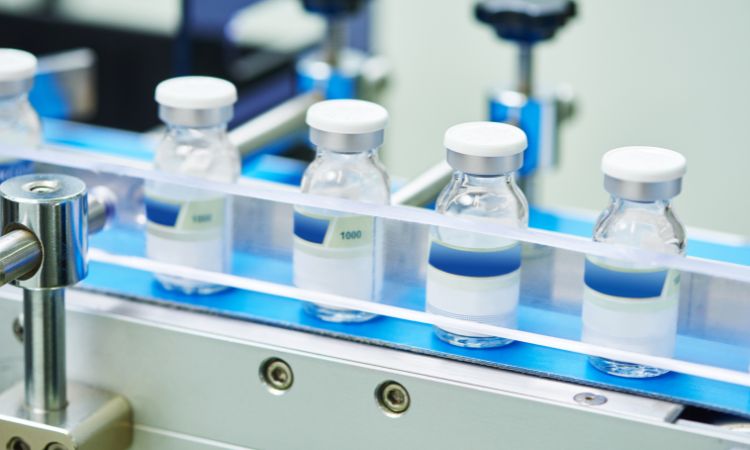The global pharmaceutical glass packaging market size reached a value of about USD 18.32 billion in 2023. The market for pharmaceutical glass packaging is being driven by emerging economies and growing demand for glass bottles. The market is further expected to grow at a CAGR of 7% in the forecast period of 2024-2032 to reach a value of approximately USD 27.48 billion by 2032. These numbers underline the significance of pharmaceutical glass packaging in the healthcare industry. In this blog post, we will delve deep into the importance of quality assurance in pharmaceutical glass packaging, exploring the critical role it plays in ensuring the safety, efficacy, and integrity of pharmaceutical products.
Section 1: Understanding Pharmaceutical Glass Packaging
Pharmaceutical glass packaging is the primary choice for storing various pharmaceutical products, including liquids, powders, and injectables. Its popularity stems from the inherent qualities of glass, which include being non-reactive, impermeable, and transparent. These attributes make glass an ideal material for preserving the potency and purity of drugs. Glass bottles and vials are commonly used for medications such as antibiotics, vaccines, and insulin.
Section 2: The Consequences of Inadequate Quality Assurance
Inadequate quality assurance in pharmaceutical glass packaging can have dire consequences. Quality issues can compromise the safety and efficacy of drugs, leading to adverse effects on patients. For instance, a poorly manufactured glass container may not provide an adequate barrier against contaminants or may interact with the drug formulation, causing chemical instability. This can result in reduced drug potency, altered therapeutic effects, and even patient harm.
One of the most glaring examples of the repercussions of inadequate quality assurance in pharmaceutical packaging is the occurrence of product recalls. Several high-profile recalls have been linked to packaging defects, costing pharmaceutical companies millions in losses and damaging their reputation.
Section 3: Quality Assurance Measures in Glass Packaging
To prevent such issues, pharmaceutical manufacturers employ a rigorous quality assurance process throughout the lifecycle of glass packaging. This process encompasses material selection, manufacturing processes, and comprehensive inspection and testing protocols.
Material selection is a critical step. Pharmaceutical-grade glass must meet specific criteria to ensure purity, durability, and chemical resistance. Manufacturers often opt for borosilicate glass, known for its low alkalinity and high thermal resistance, which reduces the risk of drug-glass interactions and breakage.
The manufacturing processes involved in producing glass containers for pharmaceutical use must adhere to strict quality standards. Any deviation in temperature, pressure, or composition can lead to defects such as cracks, weak spots, or impurities that compromise the integrity of the glass.
Section 4: Regulatory Requirements and Standards
Ensuring compliance with regulatory requirements and industry standards is paramount in pharmaceutical glass packaging. Regulatory agencies, such as the U.S. Food and Drug Administration (FDA) and the European Medicines Agency (EMA), have established guidelines that manufacturers must follow to ensure product safety and efficacy.
These regulations cover various aspects, including container closure integrity, chemical stability testing, and visual inspection criteria. Failure to comply with these standards can result in delays in product approval or market access and may lead to costly corrective actions.
Section 5: Benefits of Effective Quality Assurance
The benefits of effective quality assurance in pharmaceutical glass packaging extend beyond compliance with regulations. They directly impact patient safety, product integrity, and a manufacturer’s reputation.
Effective quality assurance measures ensure product integrity by reducing the risk of contamination or drug-glass interactions. This, in turn, enhances the shelf life and stability of pharmaceutical products, allowing patients to receive medications that are safe and effective.
Section 6: Case Studies
To illustrate the practical impact of quality assurance in pharmaceutical glass packaging, let’s examine a few real-world case studies.
Case Study 1: XYZ Pharmaceuticals
XYZ Pharmaceuticals, a leading manufacturer of vaccines, implemented a comprehensive quality assurance program for its glass vials. By enhancing their quality control measures, they achieved a significant reduction in packaging-related defects and contamination rates. As a result, the company improved the safety and efficacy of its vaccine products and gained a competitive edge in the market.
Case Study 2: ABC Biotech
ABC Biotech, a biopharmaceutical company, faced a product recall due to glass vials with compromised integrity. The incident led to substantial financial losses and damaged the company’s reputation. In response, ABC Biotech revamped its quality assurance processes, investing in state-of-the-art inspection technology and adopting stricter manufacturing standards. This proactive approach not only prevented further recalls but also improved customer trust.
Section 7: Challenges and Future Trends
While quality assurance is paramount in pharmaceutical glass packaging, the industry faces several challenges. These include maintaining consistency in glass quality, addressing supply chain disruptions, and adapting to evolving regulatory requirements.
Looking ahead, several trends and innovations promise to shape the future of quality assurance in pharmaceutical glass packaging. These may include advancements in automated inspection systems, improved testing methodologies, and the development of eco-friendly packaging solutions.
Conclusion
In conclusion, the global pharmaceutical glass packaging market’s rapid growth underscores its critical role in the healthcare industry. The market’s trajectory is expected to remain positive, driven by emerging economies and increased demand for glass bottles. However, to capitalize on this growth, pharmaceutical manufacturers must prioritize quality assurance.
Quality assurance in pharmaceutical glass packaging is not just a regulatory requirement; it is the cornerstone of patient safety and product efficacy. It ensures that pharmaceutical products maintain their integrity and therapeutic properties throughout their shelf life. By implementing effective quality assurance measures and staying abreast of industry trends, pharmaceutical companies can continue to provide safe, reliable, and effective medications to patients worldwide. However, if you want read more these kind of review articles then feel free to reach out to Best Buy Singapore.
